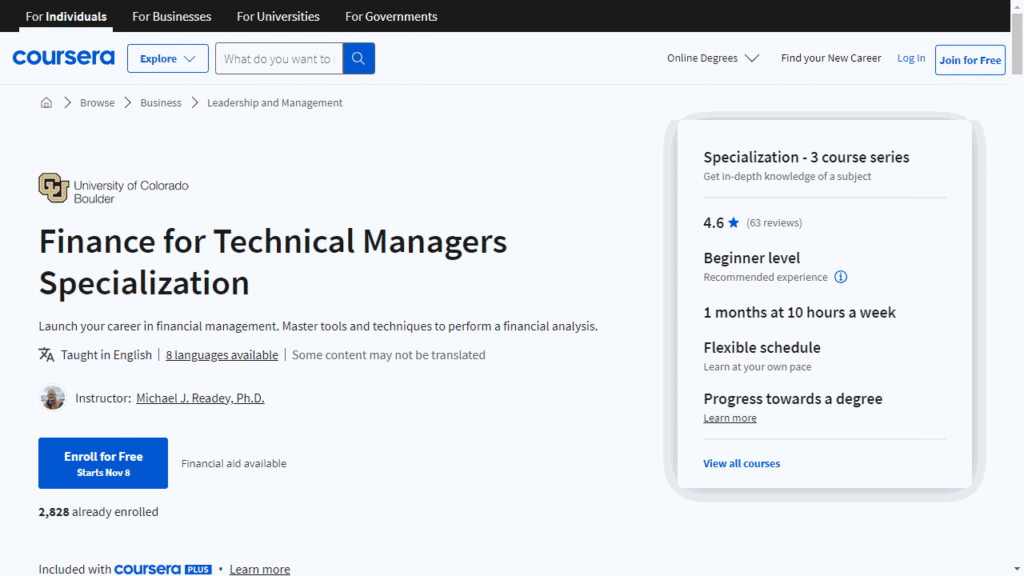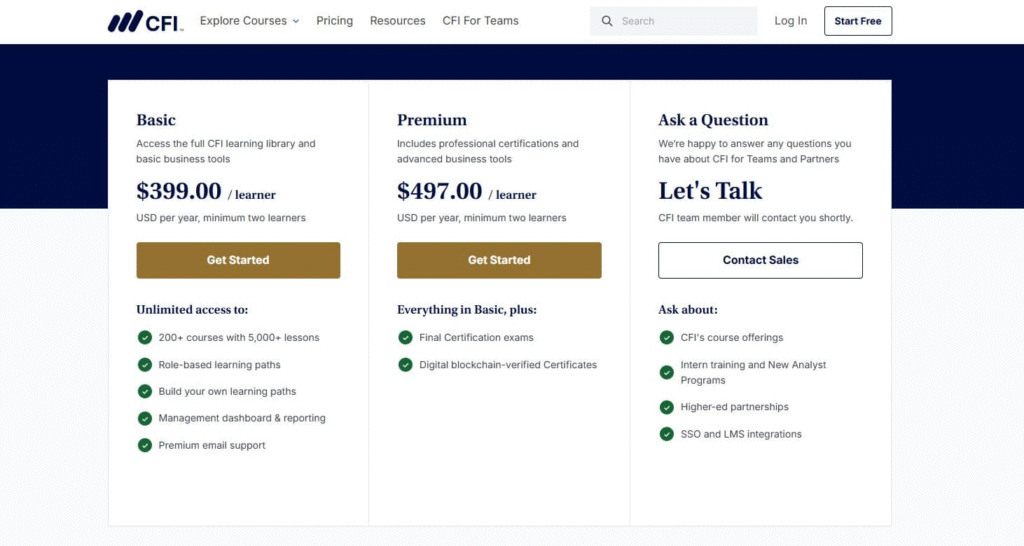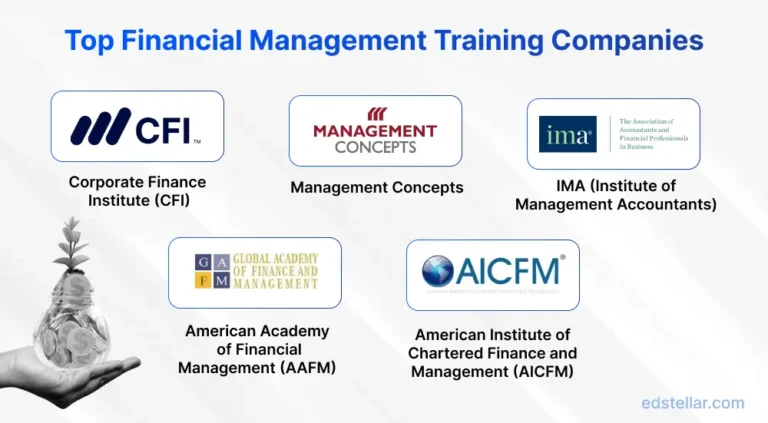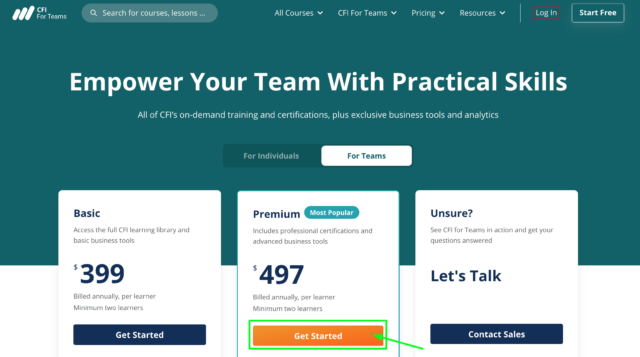Online learning has opened the doors to top-tier finance education — but with so many options, how do you choose the right one? If you’re comparing CFI (Corporate Finance Institute), Coursera, and Udemy, you’re not alone.
Each platform caters to different learners, budgets, and goals. In this comprehensive guide, we’ll break down the pros, cons, features, and pricing of each to help you decide which is best for your finance career.
What These Platforms Offer
1. CFI (Corporate Finance Institute)
CFI specializes exclusively in finance training and professional certifications.
- Known for programs like FMVA®, BIDA™, and CMSA®
- Focuses on real-world finance, Excel, modeling, and analytics
- Popular with professionals, students, and corporate teams

2. Coursera
Coursera is an academic platform that partners with top universities and companies.
- Offers finance courses from Yale, University of Michigan, etc.
- Many courses come with certificates or even degree pathways
- Flexible learning model with peer-reviewed assignments

3. Udemy
Udemy is a massive marketplace with user-generated content on nearly any topic.
- Thousands of affordable finance courses
- Lifetime access with one-time payment
- Popular for beginner-level and skill-specific topics

Who Should Choose What?
| Platform | Best For | Skill Level | Learning Type |
|---|---|---|---|
| CFI | Career-focused learners | Intermediate to Advanced | Certification-based |
| Coursera | Academic learners | All levels | University-style |
| Udemy | Budget learners & beginners | Beginners | Topic-based, practical |
In-Depth Comparison
1. Course Quality & Depth
CFI:
- Built by former investment bankers and Wall Street professionals
- Highly practical and job-ready
- Great for mastering Excel, valuation, FP&A, and modeling
Coursera:
- Theory-heavy courses from institutions like Wharton, Yale, HEC Paris
- Includes quizzes, peer assignments, and case studies
- Some courses are outdated, depending on the provider
Udemy:
- Instructor-dependent quality (hit or miss)
- Strong for niche topics and quick skills (e.g., budgeting in Excel)
- Lacks academic or institutional rigor
2. Certifications & Credibility
| Platform | Type of Credential | Recognition |
|---|---|---|
| CFI | Certified programs (FMVA, BIDA, etc.) | Recognized in finance industry |
| Coursera | University or company certificates | Highly credible (depends on provider) |
| Udemy | Completion certificate | Not recognized by employers |
If your goal is job-ready credentials, CFI is the clear winner. For academic prestige, go with Coursera.
3. Pricing & Affordability
CFI:
- Subscription-based (around $497/year for self-study)
- Get access to 100+ finance courses and certifications
- Regular discounts and coupons available
[Use our codes to save: up to 30% off]

Coursera:
- Some courses are free (audit mode)
- Certificates or specializations cost $39–$79/month
- Degrees cost thousands of dollars
Udemy:
- Courses usually priced between $9.99–$19.99 (on discount)
- No subscription model; lifetime access

4. Flexibility & User Experience
- CFI: Structured path with progress tracking and downloadable templates
- Coursera: Weekly modules, deadlines, and assessments mimic real classroom
- Udemy: Learn at your own pace with video chapters and no deadlines
Standout Features
CFI:
- Financial modeling templates
- Career roadmap with resume/interview tips
- Certification paths (FMVA®, BIDA™, CMSA®)
Coursera:
- University affiliation
- Graded peer-reviewed projects
- Option for MasterTrack & degrees
Udemy:
- Bite-sized learning
- Quick entry into new topics
- Budget-friendly for testing interests
Which Platform Do Employers Prefer?
- For job roles in corporate finance, investment banking, and FP&A, CFI is highly regarded.
- For consulting, academia, or general knowledge, Coursera offers prestige.
- Udemy is best suited for self-starters looking to build individual skills, not credentials.
Final Verdict: Which One Should You Choose?
Choose CFI if:
- You want job-specific finance certifications
- You’re preparing for roles like Financial Analyst, FP&A, or Investment Banking
- You want downloadable Excel models and career tips
Choose Coursera if:
- You prefer university-style learning
- You’re aiming for formal recognition (e.g., from Yale or Michigan)
- You’re open to structured deadlines and assessments
Choose Udemy if:
- You’re on a budget
- You want quick learning on a specific finance skill
- You’re just exploring the field

FAQ – CFI vs Coursera vs Udemy
Q1. Are CFI certifications recognized globally?
Yes, CFI’s FMVA®, BIDA™, and CMSA® programs are recognized by thousands of finance professionals and employers worldwide.
Q2. Can I get a finance job by studying on Udemy?
Not usually. Udemy is great for learning, but its certificates are not considered professional qualifications.
Q3. Is Coursera free for finance courses?
You can audit many courses for free, but to earn a certificate or complete a specialization, you’ll need to pay.
Q4. Is CFI better than Coursera for job readiness?
Yes. CFI focuses on practical, job-ready finance skills, while Coursera leans more toward academic knowledge.
Q5. Do all CFI courses come with certification?
Most courses contribute to certifications like FMVA or BIDA, but individual course certificates are also available.
Conclusion: The Right Platform Depends on Your Goal
When it comes to learning finance in 2025, all three platforms—CFI, Coursera, and Udemy—have something to offer.
- If career advancement and credentials are your priority, go with CFI.
- If you want theoretical depth and academic prestige, Coursera is your best bet.
- If you’re looking for affordable and flexible learning, Udemy is ideal.
For serious finance learners, CFI offers the best ROI, and you can save even more using our exclusive coupons.









